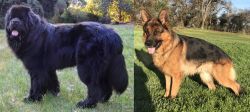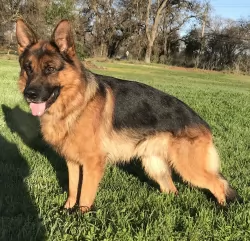 MyDogBreeds
MyDogBreeds Newfoundland Dog is originated from Canada but German Shepherd is originated from Germany. Newfoundland Dog may grow 7 cm / 3 inches higher than German Shepherd. Newfoundland Dog may weigh 36 kg / 80 pounds more than German Shepherd. Newfoundland Dog may live 3 years less than German Shepherd. Newfoundland Dog may have less litter size than German Shepherd. Newfoundland Dog requires Moderate maintenance. But German Shepherd requires Low maintenance
Newfoundland Dog is originated from Canada but German Shepherd is originated from Germany. Newfoundland Dog may grow 7 cm / 3 inches higher than German Shepherd. Newfoundland Dog may weigh 36 kg / 80 pounds more than German Shepherd. Newfoundland Dog may live 3 years less than German Shepherd. Newfoundland Dog may have less litter size than German Shepherd. Newfoundland Dog requires Moderate maintenance. But German Shepherd requires Low maintenance
 The Newfoundland dog is a large working dog. They were bred and used as a working dog for fishermen in the Dominion of Newfoundland, an eastern province of Canada. With their web feet they were also used for water rescue.
The Newfoundland dog is a large working dog. They were bred and used as a working dog for fishermen in the Dominion of Newfoundland, an eastern province of Canada. With their web feet they were also used for water rescue.
The history of the Newfoundland Dog is unsure, but the breed as we know it today originated from dogs which were brought from Newfoundland to England in the early 1800's.
The Newfoundland Club was founded in 1886 so as to promote the breed.
 In 1882 german shepherd was introduced in a show at Hanover. They were created
by the cross breeding of the rural sheep dogs by a man named Max. In 1906 they were first
exported to America. After that the breed became very popular in UK.
In 1882 german shepherd was introduced in a show at Hanover. They were created
by the cross breeding of the rural sheep dogs by a man named Max. In 1906 they were first
exported to America. After that the breed became very popular in UK.
 The Newfoundland is a large dog standing at between 63cm to 74cm, both male and female. Weight can vary from 45kg to 80kg.
The Newfoundland is a large dog standing at between 63cm to 74cm, both male and female. Weight can vary from 45kg to 80kg.
He has a double coat of medium-length straight hair and the hair can be black, brown or gray. Although it is common for the Newfoundland to have a solid-colored coats, you will sometimes find small patches of white on their chest, toes, or at the tip of the tail. Then again you get the less common Newfoundlands where the coat is white with some black markings and these are known as Landseers.
The outer coat is coarse, oily and water-resistant quality, suited to a dog that loves to spend time in the water. The head is broad and large with small ears that he keeps lying close to his head. The tail is long and plumed and the feet are wide with webbing between the toes which aids him with swimming.
As with many large dogs, the Newfoundland is docile and his sheer size makes it that he is best suited to life in the countryside as opposed to living in the city. This is also because this particular dog wants to be close to water where he can swim.
He is a trustworthy, loyal dog and will get on well with children and pets in the home. Training and socialization is always recommended for any dog, but a big dog can often ‘get in the way’ indoors and you want him to lie down or sit when you tell him to. He is an intelligent dog so will respond well to training.
 The GSD is very good for being a watchdog and hence it do not welcome guests to home.
But when trained from a puppy it will suit itself for making new friends. GSD like to be
always with somebody and they can be its master or his family members or else its partner.
The GSD is very intelligent and active hence they should be always kept busy, exercised
and playing. Nowadays many of them are trained well and made as four legged stars.
The GSD is very good for being a watchdog and hence it do not welcome guests to home.
But when trained from a puppy it will suit itself for making new friends. GSD like to be
always with somebody and they can be its master or his family members or else its partner.
The GSD is very intelligent and active hence they should be always kept busy, exercised
and playing. Nowadays many of them are trained well and made as four legged stars.
When we see all around the world many of them are involved in helping the physically challenged people. Also they are very important personnels in working with police and military for finding the criminals. Their excellent sniffing power works very good when given proper training for finding illegal smuggling. But basically the breed was set in to herd the sheep and protect them from predators.
Based on the popularity they are ranked 2nd in US and 4th in UK.
 Your beautiful, cuddly puppy will soon become a giant dog with a big appetite. Don’t just buy a cute puppy if you can’t afford to feed him properly and you can’t give him lots of attention.
Your beautiful, cuddly puppy will soon become a giant dog with a big appetite. Don’t just buy a cute puppy if you can’t afford to feed him properly and you can’t give him lots of attention.
Your dog will also be shedding, so be aware of these aspects before you bring a large Newfoundland into your home. He is a gentle dog, but his size could be worrisome if he isn’t trained, socialized and supervised.
Newfoundlands are amicable dogs, and while he may like to spend times indoors with you relaxing, he is a working dog and will require exercise and activities for mind and body.
Give this giant of a dog a loving home, and you will have a special, devoted friend like no other.
 The GSD is a very good child friendly dog, they love to play with kids.
The GSD is a very good child friendly dog, they love to play with kids.
They adopts both hot and cold climates, but they like cold weather very much and also their body is suitable for cold than hot.
The GSD has high ability to learn tricks and also they are interested in learning. As they have very high intelligence they learn very easily and quickly.
 The Newfoundland can be prone to serious health conditions such as hip dysplasia and gastric torsion. Deep chested dog breeds like the New Foundland are susceptible to bloat, a life threatening condition where the stomach swells, it can twist and the dog can die if help isn’t available. He will be salivating, restless and whining while also trying to vomit.
The Newfoundland can be prone to serious health conditions such as hip dysplasia and gastric torsion. Deep chested dog breeds like the New Foundland are susceptible to bloat, a life threatening condition where the stomach swells, it can twist and the dog can die if help isn’t available. He will be salivating, restless and whining while also trying to vomit.
Giant breeds are also prone to elbow and hip dysplasia, a genetic problem which can ultimately affect your dog’s mobility.
When in any doubt about your pet’s health, get him to the vet.
 The GSD has the chances for getting orthopaedic diseases such as hip dysplasia
and elbow dysplasia. Other common orthopaedic problems which affects GSD are Panosteitis,
Osteochondritis and cruciate ligament rupture.They also get some skin problems such as
allergies and pyoderma. Digestive problems such as chronic diarrhea and colitis are
also seen in GSD.
The GSD has the chances for getting orthopaedic diseases such as hip dysplasia
and elbow dysplasia. Other common orthopaedic problems which affects GSD are Panosteitis,
Osteochondritis and cruciate ligament rupture.They also get some skin problems such as
allergies and pyoderma. Digestive problems such as chronic diarrhea and colitis are
also seen in GSD.
GSD is a continuous shedder. They are having a two layer coat. They should be brushed daily as it will remove the dead fur and thus prevents shedding.
 Your dog’s coat will need to be brushed at least twice a week as he is a heavy shedder.
Your dog’s coat will need to be brushed at least twice a week as he is a heavy shedder.
Do the nails of your dog as soon as they start getting long. Long nails can hook on things and cause injury to the dog’s paw area.
This is a dog with floppy ears so check inside the ears to prevent ear infections, more so because this is a water-loving dog. The dampness inside the ears can cause bacteria.
This is a giant breed and sadly, they have the shortest lifespans. You want to make sure that you keep your giant breed as healthy as possible to ensure he reaches the 10 or so years allotted to him and to also prevent health problems.
Make sure your giant breed puppy and adult has the very highest quality commercially manufactured food to ensure he gets the right balance of nutrients in. This food also makes sure that your puppy rather grows at a slower rate and stronger as opposed to growing too quickly. Rapid growth comes with joint problems.
All dogs, large and small, don’t want exotic, strange food that upsets their stomachs. They want consistency and simplicity and they want tasty food. Give him some homemade food such as cooked chicken, brown rice or pasta and some vegetables such as sweet potato, carrots and spinach. You can add this occasionally to his dry kibble.
Add in some raw meat from time to time too. Your pet will be strong, healthy, happy and content.
 The GSD should be given an cool environment which they will enjoy a lot.
The GSD should be given an cool environment which they will enjoy a lot.
The GSD puppy should be fed small quantities of food but several times per day as it needs to gain 2 gms weight per day. The preferred food for them is dry food along with raw liver pieces which would provide them excellent energy. The protein food given to puppy should contain 25 to 30% calories. Puppies consume more food when compared with adults.
The GSD needs a food which has a considerable amount of protein. They are carnivores in the nature. The protein can be given from cooked meat. The artificial food products will not be suitable for them. When are provided with protein food they will gain fat from itself. The recommended fat content for GSD is 5% to 8%.
The GSD should be provided with a nutritional food for their good health.
Physical exercises are very much needed for GSD since they are very energetic and power packed. It is highly recommended to make them play and run daily as they don't need to get bored. They can be made to climb in hilly areas as they want to explore their surroundings. They can be made to swim or play hide and seek and find the missing objects. Regular morning walk will be very good for them.